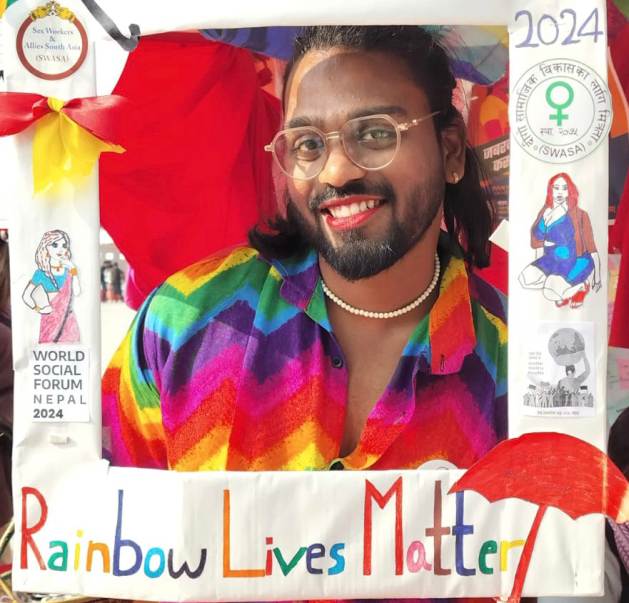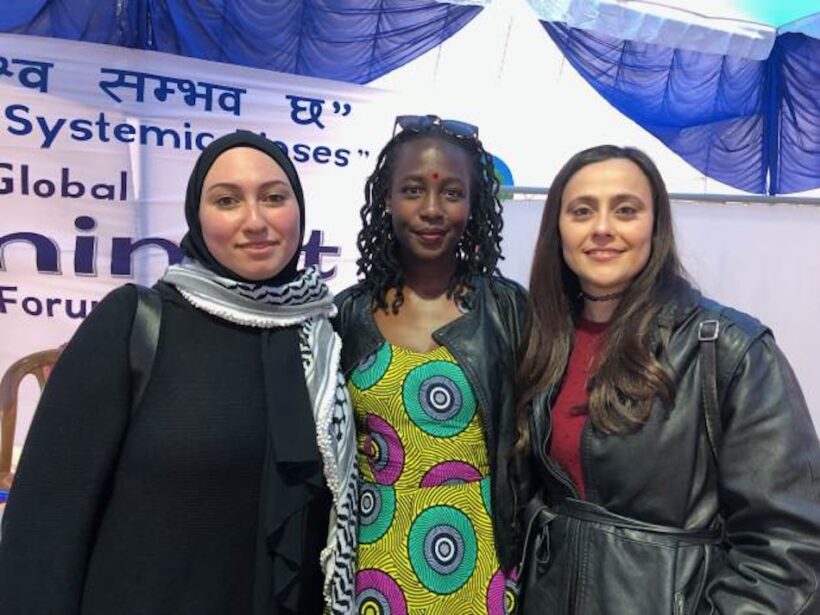On a white canvas, people painted various structures, objects, and creatures in different colors. Kavita Sada Musahar’s creation was on its way to becoming a painting (with houses, people, birds, trees, and rivers) and a bright red heart.
By Tanka Dhakal
“I painted a heart,” said the young activist at the World Social Forum (WSF) in Kathmandu on Sunday. “But some people don’t use their hearts and that’s why we don’t see empathy around us. I felt that we all have hearts and we need to know them and use them to treat everyone with equality and respect.”
Gender and sexuality lenses are a “luxury”.
“The issues faced by women and queer people in other countries are not a topic of discussion in our space. We don’t have the time or the luxury to focus on these issues,” said Safyeh, visibly moved.
“With the war and occupation going on, we can’t talk about harassment, the law, bodily autonomy, or sexuality. These are luxuries for Palestinians, especially women and the queer community,” she added.
The ongoing war in Gaza has already killed more than 28,000 people, most of them women and children. “Once the occupation ends, there will be time to solve our problems and liberate ourselves, or at least focus on overcoming all forms of discrimination to achieve real liberation,” Safyeh added.
While expressing solidarity with Safyeh, Ivy Teressa, a young feminist activist from the African country of Kenya, shared in the same session her vision of a just world where people listen and engage in healthy discussions on how to move forward.
“But for that to happen, we have to solve systemic problems first. We’re dealing with patriarchy, which means we don’t have time to take a break,” Teressa said, while also highlighting the potential criticism and judgment people may face from people who are used to living with patriarchy.
“We may be bullied and isolated. But we need to engage in discussions every day; we need to share knowledge about feminism and gender identities and sexuality in every possible way”.
In recent years, feminist movements around the world have come under attack from large sections of society, but Lebanese filmmaker and activist Farah Shaer stressed the importance of continuing the struggle.
“It doesn’t matter what they say or want, as long as we keep focusing on what we want, demanding our rights until we are equal. Then maybe we can stop calling ourselves feminists,” Shaer said. “There’s a long way to go until then; we’re going to call ourselves feminists and if it bothers them, there’s nothing we can do about it.”

Indian queer activist Pritesh Sanjeevani Chandramani Kamble at the World Social Forum in Kathmandu. Image: Tanka Dhakal / IPS
Towards an egalitarian society
In Rosy Zuniga’s vision, the way to equality is through education. “Through education that focuses on critical thinking, we will be able to see the world from different perspectives,” the Mexican activist told IPS.
“Education opens up economic opportunities and the means to organize, which ultimately leads to liberation from all forms of discrimination,” added Zúñiga, who works in feminist education in Latin America.
Read the full version of this article here.
According to the International Finance Corporation, gender equality and economic inclusion are essential for economic growth and development. “No country, community or economy can achieve its potential or meet the challenges of the 21st century without the full and equal participation of women and men, girls and boys,” the organization says.
Equal treatment and opportunities in all sectors of society are prerequisites for real change, said queer activist Pritesh Sanjeevani Chandramani Kamble. “As a gay man, I must say that if everyone respects and accepts humanity irrespective of gender and sexuality, it would be the first step towards creating a different world,” he added.
“If we create equal opportunities in all areas, that is the second step. In addition, we need to think about the rights, livelihoods, and inclusion of the queer community,” added Kamble, who works on issues related to advancing equality and inclusion in India.










